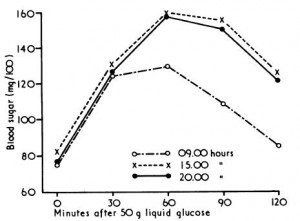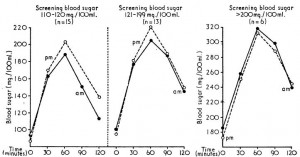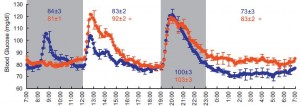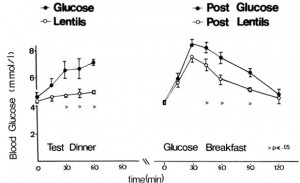Don’t exacerbate afternoon diabetes with afternoon carbs.
Skeletal Muscle
As discussed previously [at length], insulin sensitivity in skeletal muscle follows a circadian pattern: starts out high in the morning and wanes throughout the day.
Diurnal variation in glucose tolerance and insulin secretion in man (Carroll and Nestel, 1973)
Adipose Tissue
And insulin sensitivity of adipose tissue goes in the opposite direction: starts out low, and increases as the day progresses.
Diurnal variations in peripheral insulin resistance and plasma NEFA: a possible link? (Morgan et al., 1999)
The studies were standardized for a period of fasting, pre-test meal, and exercise… Following insulin, NEFA fell more slowly in the morning (149 uM/15 min) than in the evening (491 uM/15 min).
Diurnal variation in glucose tolerance: associated changes in plasma insulin, growth hormone, and non-esterified fatty acids (Zimmet et al., 1974)
Adipose tissue insulin sensitivity is greater in the evening. FFA are higher, and get shut down more rapidly, after a carb meal in the evening.
Summary: to minimize blood glucose excursions and proclivity for fat storage, eat more calories earlier in the day; this is circadian nutrient timing. And according to the Alves study, a low-carb protein-rich dinner best preserves lean tissue during weight loss.
Diabetes Paradox
Interestingly, the circadian variation of skeletal muscle insulin sensitivity is blunted in patients with insulin resistance and/or obesity. This is known as a “diabetes paradox” in some circles.
Diurnal variation of oral glucose tolerance: a possible pointer to the evolution of diabetes mellitus (Jarrett and Keen, 1969)
“In hyperglycaemic individuals the diurnal variation decreased as the blood sugar levels reached during the morning test increased, so that in a group of grossly hyperglycaemic men the mean morning and afternoon tests were almost identical.”
Further observations on the diurnal variation in oral glucose tolerance (Jarrett and Keen, 1970)
“In those with screening blood sugar levels >110 mg/dl, the degree of diurnal variation was least in those with the highest morning glycaemia… In a group of 40 control subjects, afternoon glucose tolerance tests yielded significantly higher post-glucose blood sugar levels. The degree of diurnal variation was significantly and inversely related to the degree of obesity.”
Afternoon Diabetes
Many of us have it to a degree, and one study suggested women may fare worse than men.
Does ‘‘afternoon diabetes’’ predict diabetes? (Jarrett et al., 1978)
Higher fasting glucose (pre-diabetic) = attenuated diurnal variation in OGTT. ‘Afternoon diabetics’ more likely to become frank diabetics.
Circadian biohack
Collectively, these data suggest that skewing more calories earlier in the day, when insulin sensitivity is high in muscle and low in adipose, bodes better forbody composition and blood glucose control, and this doesn’t work if circadian arrhythmic or insulin resistant. Get some blue blockers… they won’t fix everything, but it’s a start.
Part II: impact of circadian mismatched meal timing (I’m honestly nottrying to become the “breakfast [in the morning] guy,” but that seems inevitable.)
Effect of breakfast skipping on diurnal variation of energy metabolism and blood glucose (Kobayashi et al., 2014)
Skipping breakfast resulted in higher 24-hour average blood glucose levels, by 6 points. That’s not a lot, but this was after only one day… and since skipping breakfast is a circadian mismatch, this likely won’t improve over time. Also, are you surprised? Skeletal muscle is naturally more insulin sensitive in the morning; this is a good time to eat.
Acute effect of late evening meal on diurnal variation of blood glucose and energy metabolism (Sato et al., 2011)
“The present study under controlled sedentary condition supports the notion that a single late evening meal enhances 24-hour average blood glucose by 4 points.” That’s not a lot, but this was after only one day… and since late night eating is a circadian mismatch, this likely won’t improve over time. Also, are you surprised? Skeletal muscle is naturally more insulin resistant in the evening; not a good time to carb-load.
The second-meal phenomenon is associated with enhanced muscle glycogen storage in humans (Jovanovic et al., 2009)
“The rise in plasma glucose after lunch was significantly less if breakfast had been taken, despite comparable insulin responses.” In circadian biology, there’s talk of a food-entrainable oscillator (FEO); kind-of-like the importance of timing of light exposure (LEO), meal timing is also important. Breakfast [in the morning] seems like the optimal time to kickstart the FEO.
Collectively, these studies confirm that eating out of sync, when muscle & adipose are less & more insulin sensitive, respectively, results in elevated blood glucose levels. Over time, no bueno.
Second-meal effect: low-glycemic-index foods eaten at dinner improve subsequent breakfast glycemic response (Wolever et al., 1988)
A low glycemic index dinner is similar to a small &/or low carb dinner due to its minimal impact on metabolic homeostasis. Compromise? Have a low net carb, protein-rich dinner.
Prospective study of breakfast eating and incident coronary heart disease in a cohort of male US health professionals (Cahill et al., 2013)
Breakfast skippers had a 27% higher relative risk of coronary heart disease, and late-night eaters had a 55% higher risk… I imagine these numbers are so much higher than the 4-6 point increases in blood glucose because this study was over the course of 16 years; the others, 1 day… also, don’t rip off my head for citing an epidemiological study just yet; rationale is further explained below.
Skipping breakfast and late-night carbs cause elevated 24h average blood glucose (Kobayashi, Sato, & Wolever), exaggerated glycemic response to meals (Jovanovic), and are correlated with metabolic deterioration (Cahill). Given the short-term intervention studies and the sound physiological rationale predicted by circadian biology, I suspect there’s a good deal of causation in that there correlation.
Conclusions
Optimal: eat more when the tissue-specific circadian regulation of insulin sensitivity is high in muscle and low in adipose = earlier in the day. If circadian mismatched, FIX IT… these biohacks simply won’t work as well in that condition.
Nutrient timing > CICO. Period… however, all of this is assuming a a plant-based, low net carb, whole foods template. And a protein-rich breakfast; not typical breakfast food crap.
Don’t exacerbate afternoon diabetes with afternoon carbs.
That’s all for now!
If you’re interested in personalized health consulting services, send me an email:drlagakos@gmail.com.
If you like what I do and want to support it, check out my Patreon campaign!
Affiliate links: KetoLogic for keto-friendly shakes, creamers, snacks, etc. And get 15% off your ketone measuring supplies HERE.
Still looking for a pair of hot blue blockers? TrueDark is offering 10% off HERE and Spectra479 is offering 15% off HERE. If you have no idea what I’m talking about, read this then this.
Join Binance and get some cryptoassets or download Honeyminer and get some Bitcoins for free!
20% off some delish stocks and broths from Kettle and Fire HERE.
If you want the benefits of ‘shrooms but don’t like eating them, Real Mushrooms makes great extracts. 10% off with coupon code LAGAKOS. I recommend Lion’s Mane for the brain and Reishi for everything else.
Join Earn.com with this link.
Start your OWN Patreon campaign!
to see older comments: go HERE





